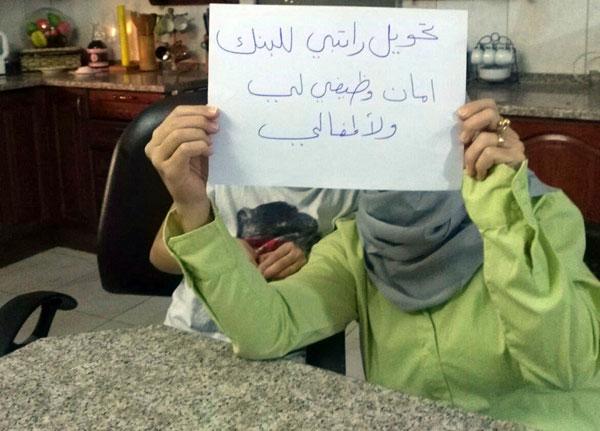You are here
Teachers campaign for financial rights despite pressure
By Fares Al Abed - Oct 05,2017 - Last updated at Oct 05,2017

A teacher holds a sign saying ‘Transferring my salary to my bank account is a job security for me and my children’ (Photo courtesy of Stand up with the Teacher campaign›s Facebook page)
AMMAN — Private school teachers have taken to social media to push their employers to deposit their salaries in bank accounts, thus ensuring that they receive their financial compensation in full.
The “Stand up with the Teacher” campaign was launched in Irbid, 80km north of Amman, to empower female teachers working at private schools to demand their labour rights. It was created and supported by the National Committee for Pay Equity and the International Labour Organisation (ILO), according to the campaign statement.
The campaign has faced multiple challenges, mostly not being able to provide protection for teachers who demanded their rights from the employers’ retaliation or from losing their source of income.
As a result, when the campaign approached new teachers, they often cited a fear of losing income or a lack of belief that change was possible. The campaign therefore became unable to expand and recruit more teachers.
Reem Aslan, ILO’s Pay Equity project consultant, told The Jordan Times over the phone that 1,000 female teachers have signed on the demand to cash their salaries via bank accounts.
“The reason is that we want to make sure that teachers receive their ‘full’ salary, since bank transactions allow government monitoring,” she explained.
Aslan noted that there are about 37,000 teachers in the private education sector, and one-third of them, if not more, don not get paid the minimum monthly wage, which amounts to JD220.
“Almost two-thirds of the campaign participants were either fired or are still unemployed because they stood for their cause,” she claimed.
“When we gathered Irbid’s group and Amman’s group in Jerash two weeks ago, we decided to make a move, to find a solution for female teachers’ biggest challenges,” she said.
A collective agreement regulating the working conditions of private schools teachers was signed between the General Trade Union of Private Education Employees and the Private Schools Owners’ Association under the supervision of the Ministry of Labour earlier this year.
The new collective contract, which is scheduled to be effective from the start of the 2017/18 academic year, established a standard contract for teachers in the private sector, which will be mandatory unless an alternative contract provides better benefits, the report showed.
It required all salaries to be paid directly into their bank accounts, unless agreed otherwise by the employees in a written statement.
The agreement also increased the minimum monthly wage to JD220, with a teaching allowance of JD10 per month, an annual raise of at least 5 per cent and an increase of JD5 per month for each year of employment.
“The least we can do is to equalise salaries between public schools teachers and private school teachers at JD300 minimum per month,” Aslan stated.
One of the teachers at a private school in Jabal Al Hussein said there are too many violations happening. “I have been working as an English teacher for around 10 years now. Every year, the principal asks the teachers to resign and sign new contracts,” said the teacher, who spoke on condition of anonymity.
Due to a volatile job market, teachers are forced to accept unreasonable contracts without protesting, she said, adding “the administration asked me to sign a contract that indicated that my monthly salary was JD400, while I only got JD250. I accepted because no other jobs were available”.
“I am afraid that if I go to the authorities and complain, I will lose my job. So I prefer to remain silent and deal with the situation like many other teachers,” she added.
The ILO consultant said that Education Minister Omar Razzaz has replied “positively” to one of their demands on Twitter, and that social security also responded to the campaign.
Related Articles
AMMAN — The International Labour Organisation (ILO) on Friday commended Prime Minister Omar Razzaz´s government for “safeguarding the salari
AMMAN — The National Committee on Pay Equity (NCPE) on Saturday held the first social dialogue session on the collective bargaining agreemen
AMMAN — Minister of Education Omar Razzaz on Saturday announced the ministry’s decision to require all private schools across the Kingdom to

















